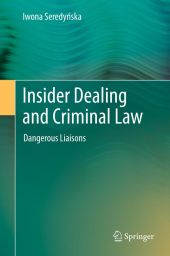 Neuerscheinungen 2014Stand: 2020-02-01 |
Schnellsuche
ISBN/Stichwort/Autor
|
Herderstraße 10
10625 Berlin
Tel.: 030 315 714 16
Fax 030 315 714 14
info@buchspektrum.de |

Iwona Seredy ska
Insider Dealing and Criminal Law
Dangerous Liaisons
2012. 2014. xviii, 278 S. 2 Tabellen. 235 mm
Verlag/Jahr: SPRINGER, BERLIN 2014
ISBN: 3-642-43138-0 (3642431380)
Neue ISBN: 978-3-642-43138-8 (9783642431388)
Preis und Lieferzeit: Bitte klicken
This work is a multidisciplinary analysis of the issue of insider dealing from the perspective of the applicability of criminal law to regulate it. First, it examines the nature of its prohibition in the European Union and in the United States of America. The text includes a more extensive overview of prohibition in four Member States of the European Union (France, the United Kingdom, Luxembourg and Poland). Then, it summarises the arguments presented by ethicists and economists in favour of and against insider dealing. Further, it analyses the foundations of criminal law and justifications that are given for its application. On the basis of this analysis, it presents a new two-step theory of criminalisation. The first step is based on a liberal theory of wrongfulness that makes reference to protection of the basic human rights. The second step relies on classical but often forgotten principles of criminal law. Finally, it examines possible alternatives to criminal rules.
Introduction.- Insider dealing prohibition - basic construction, economic and ethical perspectives.- Practical issues arising from the transposition of the Market Abuse Directive into the chosen Member States´ legal systems.- Principles-based application of the criminal law.- Alternative models of regulation of insider dealing.- Conclusions.
"A book that contains a fascinating history of the development of the prohibition of insider dealing in the USA and Europe ... . this book will inspire further research into the subject by market participants, economists and academics ... ." (Katie Wheatley, Journal of International Banking Law and Regulation, Vol. 30 (6), 2015)


